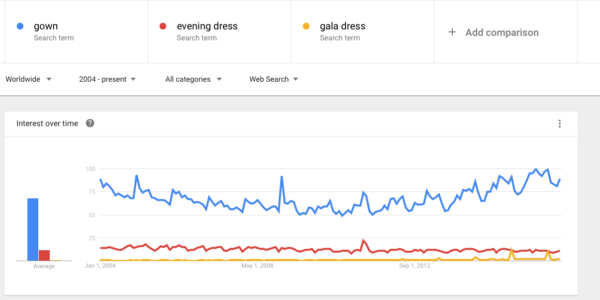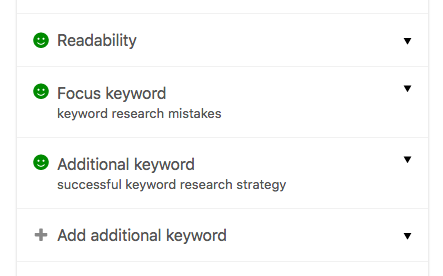Thinking about the keywords you want to rank for is really the first and foremost step you need to take for your SEO strategy. Still, keyword research can be quite daunting. So, which keyword research mistakes should you avoid at all times? In this post, I’ll take you through the most common keyword research mistakes people seem to be making. Avoiding these mistakes will help you to set up a successful keyword research strategy.
1. Not executing your keyword research correctly
Doing proper keyword research can be a tough, time-consuming process. So, perhaps you think that you don’t need to do it very extensively. You just instinctively know what your audience will search for, right? Do not make that mistake! Take some time to really dive into the language of your audience. Which words do they use? What terms do they search for?
The result of your keyword research should be an extensive list of keywords you would like to rank for. Make sure to update your keyword research list or sheet regularly. Your audience may change, as could your business focus and business needs. That has implications for your keyword strategy as well.
Read more: Keyword research: the ultimate guide »
2. Aiming at unrealistic keywords
Make sure you aim for realistic keywords. Some niches are very competitive. Ranking in competitive niches is hard if you’re just starting your website or business. If you’re just starting out, you shouldn’t aim for the competitive ‘head’ keywords (yet). Instead, focus on long tail keywords (which are easier to rank for and have a higher chance to convert).
For instance, if you start a blog about fitness, it will be too hard to start ranking for the term ‘fitness’. Find out which aspects of your blog are unique and try ranking for those terms. Perhaps you write about fitness exercises for retired people. Aiming to rank for ‘fitness for retired people’ could be a good strategy. In that case, you should also aim for ‘fitness for seniors’, ‘fitness for older adults’ and so on.
If you have been around in your niche for a little longer and you successfully rank for long tail keywords, you could aim to rank for more head terms as well. Ranking for competitive keywords should be part of a long-term successful keyword research strategy.
Keep reading: Why focus on long tail keywords? »
3. Using irrelevant keywords
The keywords you aim to rank for should be the same words your customers use. Always try to use the language of your audience. Imagine yourself selling dresses for gala events. In your marketing, you refer to these dresses as ‘gala dresses’. However, people do not search for ‘gala dress’. They search for ‘gown’ or ‘evening dress’. You won’t get much traffic for the search term ‘gala dress’ compared to the search terms ‘gown’ or ‘evening dress’.

4. Not checking whether you should use singular or plural
Always check if you should target the plural or the singular form of a specific keyword. Should you aim to rank for ‘ballet shoe’ or for ‘ballet shoes’? Do people search for ‘holiday home’ or ‘holiday homes’? While Google has become better at recognizing that the plural and singular versions of a word are the same, the search result pages and the number of results are often still different. Always check whether you should use singular or plural with Google Trends. Also, think about the intent of people searching for your keyword. Someone looking for the singular version of a keyword may be looking for information, while someone looking for the plural version could be looking to compare products and/or buy something. In any case, whether you should use a singular or a plural depends on your specific keyword, so give that some thought.
5. Aiming for keywords without traffic
Long tail keywords are a great way to start your keyword strategy. These words attract less traffic, but you’ll have a higher chance to convert your visitors into buyers or returning visitors. People that use specific terms, to search for exactly that thing you’re writing about, are just a very good match. However, if your keyword is too specific and doesn’t get any traffic, it won’t help your SEO. So make sure you aim for long tail keywords that actually bring in some traffic!
6. Forgetting to evaluate
If you aim to rank for certain terms, make sure to check whether you succeed. You need to evaluate regularly if people actually find your articles. In order to do so, you should definitely google your proposed focus keyword every now and then. But be aware that your search results may be biased because Google has personalized search. So, use a private browser session, and check if your article turns up in the results. If you forget to evaluate, you won’t know whether you could aim for more competitive keywords or you should focus on long tail variants.
Read on: Adapting your content SEO strategy »
7. Focusing on only one keyword per post
If you write a decent blog post, you could aim to rank for more than one search term. If you’re able to do that (without stretching it), you should definitely do so. For this blog post about keyword research mistakes, for instance, I am aiming to rank for ‘keyword research mistakes’ and ‘successful keyword research strategy’. Our Yoast SEO premium plugin helps you to optimize your post for more than one focus keyword.

Conclusion: avoid these mistakes and have a successful keyword research strategy
Executing keyword research takes a lot of time. It’s important that you take that time and really think about the terms you want to rank for. Read Keyword research: the ultimate guide for lots of practical tips that’ll help you to set up a successful keyword research strategy. If you need more help, consider taking our keyword research training. It guides you through every step of the process, and there’s even the option to get personalized feedback!
Keep on reading: Why every website needs Yoast SEO »